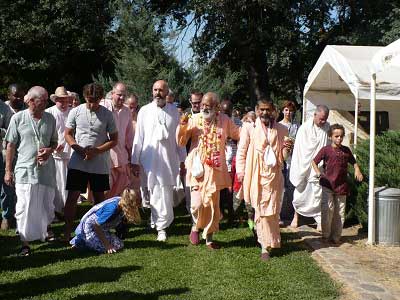Srila Bhaktivedanta Narayana Gosvami Maharaja
June 21, 2007
Badger, California
Morning Walk
Srila Gurudeva: Yesterday we explained two questions.
Sripad Bhagavata Maharaja: Yes, the questions that were answered by Kavi and Havi.
Srila Gurudeva: What was the first question?
Sripad Bhagavata Maharaja: The first question was, "What is the ultimate good, the ultimate benefit?"
Srila Gurudeva: (To Srauti Maharaja) Can you answer?
Sripad Srauti Maharaja: "What is..." Mmm...
Srila Gurudeva: It takes you so much time to answer?
Sripad Tridandi Maharaja: "What is the process to achieve...?"
Srila Gurudeva: That was not the actual question.
Sripad Damodara Maharaja: "What is the easiest way for someone to become free from the cycle of birth and death?"
Srila Gurudeva: The question was: "What is Bhagavata-dharma?"
Speaking to the nine Yogendras, King Nimi said: "Please speak about how one engages in the devotional service of the Supreme Lord, if you consider me capable of properly hearing these topics. When a living entity offers loving service to the Supreme Lord, the Lord is immediately satisfied, and in return He will give even His own self to the surrendered soul." (Srimad-Bhagavatam 11.2.31)
By engaging in the process of Bhagavata-dharma, all problems will very easily disappear, the endless pain of endless births will cease, and krsna-prema will manifest.
This was the question. What was the answer?
Sripad Bhagavata Maharaja: One must associate with sadhus. By the association of a sadhu and the holy name...
Sripad Madhava Maharaja:
ye vai bhagavata prokta
upaya hy atma-labdhaye
anjah pumsam avidusham
viddhi bhagavatan hi tan
(Srimad-Bhagavatam 11.2.34)
"Even ignorant living entities can very easily come to know the Supreme Lord if they adopt those means prescribed by the Supreme Lord Himself. The process recommended by the Lord is known as bhagavata-dharma, or devotional service to the Supreme Personality of Godhead."
Srila Gurudeva: This is the same teaching given by Krsna Himself, regarding how He can be easily attained; how we can very easily attain His love and affection. By sravanam (hearing about Him), kirtanam (chanting His names and glories), and smaranam (remembering Him), the pain born from all problems will easily disappear.
After this, Kavi explained: You have forgotten Sri Krsna. So, first go to guru, accept him, and serve him. In this way, you will be able to serve Krsna.
bhayam dvitiyabhinivesataù syad
isad apetasya viparyayo 'smrtih
tan-mayayato budha abhajet tam
bhaktyaikayesam guru-devatatma
(Srimad-Bhagavatam, 11.2.37)
"Fear arises when a living entity misidentifies himself as the material body because of absorption in the external, illusory energy of the Lord. When the living entity thus turns away from the Supreme Lord, he also forgets his own constitutional position as a servant of the Lord. This bewildering, fearful condition is affected by the potency for illusion, called maya. Therefore, an intelligent person should engage unflinchingly in the unalloyed devotional service of the Lord, under the guidance of a bona fide spiritual master, whom he should accept as his worshipful deity and as his very life and soul."
Kavi also explained:
yan asthaya naro rajan
na pramadyeta karhicit
dhavan nimilya va netre
na skhalen na pated iha
(Srimad-Bhagavatam 11.2.35)
"O King, one who accepts this process of devotional service to the Supreme Personality of Godhead will never blunder on his path in this world. Even while running with eyes closed, he will never trip or fall."
If one follows this path, even if he runs with his eyes closed he will not fall down. What is the meaning of this verse?
Sripad Bhagavata Maharaja: For those who are on this path – which has been given by Sri Krsna – practicing sravana, kirtana, and smarana under the guidance and shelter of sad-guru, it does not matter how difficult that path is.
Srila Gurudeva: No, that is not the meaning.
Sripad Sajjana Maharaja: Srila Visvanatha Cakravarti Thakura comments that running with one's eyes closed means that even if someone is not conversant with all the sastras, but he performs nava-vidhi bhakti (the nine-fold process of bhakti), he will be assured of success. Am I understanding this correctly?
Srila Gurudeva: No. (To Sripad Padmanabha Maharaja) What is the meaning?
Sripad Padmanabha Maharaja: This path of Bhagavata-dharma is directly given by Sri Krsna. All the difficulties and pitfalls that are in the paths of karma-yoga, jnana-yoga, and astanga-yoga will have no effect on the devotee because Bhagavata-dharma is the nature of the soul. The soul's natural position is to serve Sri Krsna. So if the soul submits to this process of pure bhakti, he is protected. Even if he is not perfect in following, he will still be supported.
Srila Gurudeva: (To Sripad Tridandi Maharaja) Can you tell something more about this?
Sripad Tridandi Maharaja: You have to have courage and faith to keep on moving.
Srila Gurudeva: (To Dhira Krsna dasa) Can you explain this?
Dhira Krsna dasa: It has already been emphasized that we should serve Gurudeva as our own atma. In that type of...
Srila Gurudeva: You cannot explain it; better to listen to my explanation.
Speaking the words of Kavi, Srila Sukadeva Gosvami says that if one who is on this path closes his eyes and runs very quickly, he cannot fall down or be derailed. What is the meaning? Vaidhi-bhakti is slow-going. The devotee practicing vaidhi-bhakti carefully opens his eyes, but his progress is very slow-going.
On the other hand, those who follow raganuga-bhakti are 'closing their eyes.' This means that even though they may neglect some limbs of bhakti, like dvaraka-dhyana (meditation on Krsna's pastimes in Dvaraka), or certain aspects of arcana, they are successful.
They are always weeping in this way:
evam-vratah sva-priya-nama-kirtya
jatanurago druta-citta uccaih
hasaty atho roditi rauti gayaty
unmada-van nr yati loka-bahyah
(Srimad-Bhagavatam 11.2.40)
"By chanting the holy name of the Supreme Lord, one comes to the stage of love of Godhead. Then the devotee is fixed in his vow as an eternal servant of the Lord, and he gradually becomes very much attached to a particular name and form of the Supreme Personality of Godhead. As his heart melts with ecstatic love, he laughs very loudly or cries or shouts. Sometimes he sings and dances like a madman, for he is indifferent to public opinion."
The devotional activities described in this verse are not about vaidhi-bhakti. The devotee described here is always weeping, and laughing; devoid of any shame. This is the meaning.
When one follows raganuga-bhakti, there is no harm if he neglects the few limbs of vaidhi-bhakti which are not favorable for the cultivation of raganuga. By the process of raganuga-bhakti alone, even if he neglects other processes, he will attain all success. This is the hidden meaning of 'running with eyes closed.'
Sripad Padmanabha Maharaja: Can we say, then, that the entire first answer of Kavi refers to raganuga-bhakti?
Srila Gurudeva: He begins his reply from vaidhi-bhakti, which includes his utterance of the verse beginning "bhayam dvitiyabhinivesatah," and he concludes with this reference to raganuga-bhakti.
Vrndavana dasa: In regard to what you were saying about the devotee on this path being able to reach perfection while running with his eyes closed, does this support the statement that bhakti is not dependent on anything? Is that the understanding?
Srila Gurudeva: The meaning is that in vaidhi-bhakti you follow certain rules and regulations, with very slow progress. You must go very carefully, with open eyes, respecting all and following all regulations of the bhakti line. Then, after a long time – after many births – raganuga-bhakti will manifest. 'Closing one's eyes and running very fast' refers to the raganuga sadhaka's neglect of the limbs of bhakti that are not favorable for his advancement in raganuga-bhakti. There will be no chance of falling down for him; he will continue to perfection.
Here in this verse (Srimad-Bhagavatam 11.2.40), there is no mention of the limbs of vaidhi-bhakti. The devotee described in this verse is a maha-maha-bhagavata. As mentioned, he will not fall down, even if he neglects some of the limbs of bhakti, and he will progress rapidly.
Abhirama dasa: Srila Guru Maharaja, is it favorable for our bhakti if we follow Kartika-vrata in Badger? [Kartika-vrata is a one month vow (Oct.-Nov.) to follow certain regulations, restrict the intake of certain foodstuffs, and visit the pastimes places of Krsna in Vrndavana]
Srila Gurudeva: Surely. You can follow it anywhere. And we must follow Caturmasya-vrata [a four-month vow of restricting the intake of certain foodstuffs]; not only in Badger, but everywhere in the world.
Padmanabha dasa: Gurudeva, does 'closing his eyes and running' mean that the sadhaka is not following at least the basic principles of...
Srila Gurudeva: You have not understood, and therefore you cannot ask a proper question. Try to understand what I have just explained.
Padmanabha dasa: I understood a little bit, Gurudeva.
Srila Gurudeva: You cannot understand. You will have to become like them (the sannyasis and brahmacaris present); being without wife and without possessions; always thinking and hearing bhakti subjects, and serving. Then you will be able to easily understand.
Indupati dasa: We see many devotees who go to Vrndavana and simply absorb themselves in chanting. They ignore many limbs of bhakti and simply chant in Vrndavana, but after some time they leave the process entirely.
Srila Gurudeva: Such persons are not at all following raganuga. Raganuga-bhakti is very rare; very rare. Whether in Vrndavana or anywhere else, such ordinary devotees are prone to commit offenses.
What I explained is for raganuga-bhaktas like Raya Ramananda. He was taking care of young and very beautiful naked ladies, without being at all affected. Can you do so?
Indupati dasa: No, Srila Gurudeva.
Srila Gurudeva: One who tries to do so without having Srila Raya Ramananda's qualification, thus neglecting the regulative principles, is simply lusty. Only persons like Srila Svarupa Damodara and Srila Rupa Gosvami can do such things. They are qualified, and the attainment of their qualification is our life's aim and object.
Sripad Padmanabha Maharaja: Some persons say, "Srila Gurudeva is preaching raganuga-bhakti. We should therefore only hear rasa-katha, and in that way we can enter into raganuga-bhakti."
Srila Gurudeva: What am I explaining here? Raganuga-bhakti? Or what?
Sripad Padmanabha Maharaja: You are explaining vaidhi-bhakti also.
Srila Gurudeva: I am discussing mostly vaidhi-bhakti. I am not discussing anything at all about rasa-lila. Those persons are speaking falsely.
Sripad Sajjana Maharaja: Sometimes it is said that this path of bhakti is like a sharp razor's edge. Is this only said in relation to nava-vidha-bhakti (the nine-fold process of vaidhi-bhakti)?
Srila Gurudeva: It is this world that is like the sharp edge of a razor (ksurasya dhara), not bhakti. Bhakti is very soft. You do not understand? This world, which made of ignorance, is ksurasya dhara; there are problems everywhere. Give up this ignorance and come to bhakti. This is the meaning of the verse you refer to.
What was the second question of Nimi Maharaja to the Nine sages?
Sripad Nemi Maharaja: "What are the qualities of the different grades of devotees who are practicing Bhagavata-dharma?" The grades of devotees are uttama-bhagavata, madhyama, and kanistha.
Sripad Tridandi Maharaja: "And what are their activities? How do they speak? What do they do?"
Srila Gurudeva: What is their behavior?
sri-rajovaca
atha bhagavatam bruta
yad-dharmo yadrso nrnam
yathacarati yad brute
yair lingair bhagavata -priyah
(Srimad-Bhagavatam 11.2.44)
Maharaja Nimi said: Now please tell me in greater detail about the devotees of the Supreme Lord. What are the natural symptoms by which I can distinguish between the most advanced devotees, those on the middle level, and those who are neophytes? What are the typical religious activities of a Vaisnava, and how does he speak? Specifically, please describe those symptoms and characteristics by which Vaisnavas become dear to the Supreme Personality of Godhead.
What was Sri Havi's first answer to this question?
Sripad Bhagavata Maharaja: The first answer is about the uttama-bhagavata, the most advanced, first-class devotee. "Bhagavata bhavam atmana – The uttama-bhagavata sees his own mood of love for Sri Krsna in all living entities. He sees his own bhava (mood of devotion) in all other persons."
Srila Gurudeva: What is an example of how he thinks?
Sripad Bhagavata Maharaja: He thinks, "Everyone is engaged in Sri Krsna's service. Everyone has the mood (the bhava) that I have."
Srila Gurudeva: Prahlada Maharaja sees all living entities and every aspect of creation in Sri Krsna. He is an example of an uttama-bhagavata.
And who is the madhyama?
Sripad Sajjana Maharaja: A madhyama-adhikari has four different relationships. He sees the Supreme Lord and worships Him in his heart. He sees the devotees and engages in the six exchanges of love. He preaches to the innocent and ignorant, but he avoids, or neglects, the envious.
Srila Gurudeva: You are not explaining this clearly. Who will explain it?
Sripad Nemi Maharaja:
isvare tad-adhinesu
balisesu dvisatsu ca
prema-maitri-krpopeksa
yah karoti sa madhyamah
(Srimad-Bhagavatam 11.2.46)
"An intermediate or second-class devotee, called madhyama-adhikari, offers his love to the Supreme Personality of Godhead, is a sincere friend to all the devotees of the Lord, shows mercy to ignorant people who are innocent, and disregards those who are envious of the Supreme Personality of Godhead."
Srila Gurudeva: What do you mean by 'maitri'?
Sripad Nemi Maharaja: For the madhyama-adhikari there are three different kinds of friendship with devotees. In his friendship with very advanced devotees, he offers everything – his heart and soul and all he possesses. He maintains friendship with devotees on the same level of bhakti as himself, and friendship with instruction for less-experienced devotees. These are the three different kinds of maitri.
Sripad Madhava Maharaja: And prema?
Sripad Nemi Maharaja: Prema is defined in this verse:
anyabhilasita-sunyam
jnana-karmady-anavrtam
anukulyena krsnanu-
silanam bhaktir uttama
(Sri Bhakti-rasamrta-sindhu 1.1.11)
Uttama-bhakti is the cultivation of activities that are meant exclusively for the pleasure of Sri Krsna, in other words, the uninterrupted flow of service to Him, performed through all endeavors of the body, mind, and speech, and through the expression of various bhavas (spiritual sentiments). It is not covered by jnana (knowledge aimed at impersonal liberation) and karma (reward-seeking activity), yoga or austerities; and it is completely free from all desires other than the aspiration to bring happiness to Krsna.
This is prema towards Isvara, the Supreme Lord.
Srila Gurudeva: And then?
Sripad Nemi Maharaja: Balisesu means that the devotee preaches to those who are outside the devotee sanga, and who do not yet understand devotional service. Kanistha adhikaris are also balisesu, and they also need association.
Srila Gurudeva: What are the symptoms of a kanistha-adhikari?
Sripad Padmanabha Maharaja:
arcayam eva haraye
pujam yah sraddhayehate
na tad-bhaktes? canyesu
sa bhaktah prakrtah smrtah
(Srimad-Bhagavatam 11.2.47)
"A devotee who faithfully engages in the worship of the Deity in the temple but does not behave properly toward other devotees or people in general is called a prakrta-bhakta, a materialistic devotee, and is considered to be in the lowest position."
The kanistha-adhikari has sraddha, or faith, in worshiping the Deity form of the Lord. He may also have sraddha in guru and give proper respect to guru. But he does not know how to recognize devotees, nor does he know on what level different devotees are situated. He does not know how to deal with people in general, and he becomes easily influenced by them. His sraddha is komala (very soft and pliable); it can be shaken at any time.
Srila Gurudeva: Okay.
Aniruddha dasa: Can a kanistha Vaisnava preach properly?
Srila Gurudeva: What will he preach? He barely knows anything about siddhanta. He should serve madhyama-adhikari Vaisnavas and hear from them. Then he will be able to preach properly.
Devotee: Didn't Srila Svami Maharaja Prabhupada use only kanisthas to spread Krsna consciousness all over the world?
Srila Gurudeva: He used to tell them that preaching means distribution of books, reading, and associating with higher classes of Vaisnavas. How can a kanistha Vaisnava preach properly if he only knows arcana and worship of his Gurudeva? What can he preach if he doesn't factually understand the other limbs of bhakti, if he cannot differentiate between the uttama, madhyama, and kanistha-adhikari, and if he does not properly understand bhakti-siddhanta?
Devotee: Even though we were kanistha, we always said we were madhyama – because we preached.
Srila Gurudeva: Srila Bhaktivedanta Svami Maharaja wanted to somehow engage all those who came to him. He wanted them to develop a taste for bhakti. He considered that by doing the services he gave them they would advance in Krsna consciousness. This was his motive.
(To Subala Sakha dasa) Have you taken many photos in Vrndavana?
Subala Sakha dasa: In Vrndavana? Yes.
Srila Gurudeva: When will our Vraja-mandala Parikrama (coffee table size) book be published?
Subala Sakha dasa: It will come out soon. A devotee from Holland is working on the graphics and layout...
Srila Gurudeva: And what are you doing?
Subala Sakha dasa: I am selecting the photos, and then sending them to him so that he can work on them and put them...
Srila Gurudeva: I wanted this book to be published, but Niscintya could not do it and you could not do it.
Subala Sakha dasa: It will get done, Gurudeva. I give a hundred per cent guarantee that it will get done.
The end.
Transcriber: Madan Mohini dasi (New York)
Editors: Syamarani dasi, Damodara dasa (Canada), Sudevi dasi (Malaysia), Bhadra dasi (New Zealand), Jahnava dasi (Holland)
Proofreader and distributer: Vasanti dasi
Sound-files: Isa dasa
Bracketed explanations written by Syamarani dasi, from the writings and lectures of Srila Gurudeva









